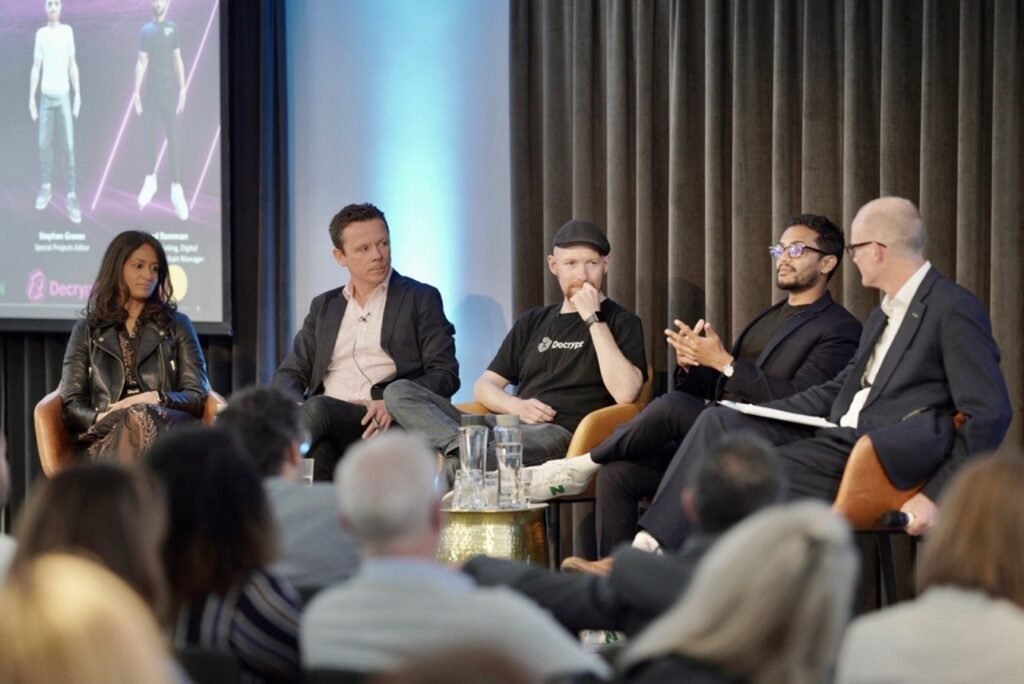In the digital era, technology continues to reshape the business landscape, and the emergence of Web3 is poised to bring another significant wave of change. Web3, also known as the decentralised web, represents a paradigm shift from the centralised control of data and platforms to a more open, transparent, and user-centric internet. For brands, this transformative technology presents a plethora of opportunities and risks that procurement professionals must navigate strategically in a space where the “brand-safe” path is key.
At last week’s ProcureCon event in London, I had the chance to talk to the industry’s leading procurement professionals on just this topic and was lucky to count on the support of our clients and partners including: Syed Romman, Global Marketing, Digital Assets and Blockchain Manager, Mastercard; Seema Khan, Senior Strategy Director, Pixel United; Conor MacLoughlin, Global Head of Marketing Procurement, Heineken and Stephen Graves, Special Projects Editor, Decrypt.
And it wasn’t just talk – for the very first time, we also gave the audience the chance to mint their own NFT, in partnership with Fireblocks, to really see how part of the mix of Web3 technologies works in practice. If that wasn’t enough, we also gave the audience a first-look at our brand new Web3 Readiness Index – check it out for yourselves here
Here’s a snapshot of what we discussed and your chance to find out more about how ready your organisation is when it comes to Web3.0 with our new Web3 Readiness Index.
Opportunities
The premise of Web3 could be seen as a rearchitecting of web technologies focused on the user, rather than simply the information. This brings huge potential value to brands in the never-ending race to get closer to customers.
Enhanced Data Ownership and Privacy Protection: Web3 technologies, such as blockchain and decentralised applications (dApps), enable individuals to have greater control over their data. This empowers brands to build trust with consumers by providing transparent data practices, ensuring privacy protection, and offering personalised experiences based on user consent.
Direct Consumer Engagement and Loyalty: With Web3, brands can establish direct relationships with consumers, eliminating intermediaries and fostering genuine interactions. Smart contracts enable the creation of loyalty programs, incentivising customers with tokens or non-fungible tokens (NFTs), which can deepen engagement and loyalty by rewarding desired behaviours.
Authenticity and Anti-counterfeiting: Web3 introduces novel mechanisms for verifying the authenticity of products and combating counterfeiting. Brands can utilise blockchain-based solutions to create immutable records of the entire supply chain, assuring consumers of the provenance and integrity of their goods, while mitigating the risks associated with counterfeit products.
Micropayments and New Revenue Streams: Web3 enables frictionless micropayments through cryptocurrencies, allowing brands to monetise content or services on a granular level. Procurement can explore partnerships with decentralised finance (DeFi) platforms to leverage novel revenue models like staking, lending, or liquidity pools that can augment their bottom line.
Risks and challenges
With every incremental or major shift in technology comes a raft of potential pitfalls. We’re working hard on behalf of clients to help them navigate this rapidly evolving sector.
Regulatory Uncertainty: As Web3 operates across borders and often bypasses traditional intermediaries, it presents complex regulatory challenges. Procurement professionals must be prepared to navigate evolving legal frameworks to ensure compliance in areas such as data protection, consumer rights, intellectual property, and financial regulations.
Scalability and User Experience: Web3 technologies are still in their infancy, and many blockchain-based platforms face scalability issues and suboptimal user experiences. Brands need to carefully assess the readiness of Web3 solutions and evaluate their capacity to handle the transactional volumes required by their operations without compromising user satisfaction.
Reputation Management: The decentralised nature of Web3 allows for open participation, but it also poses challenges in terms of reputation management. Procurement professionals need to be aware of the risks associated with brand impersonation, defamation, or fraudulent activities conducted on decentralised platforms and establish proactive strategies to mitigate potential reputational damage.
Volatility and Financial Risks: Cryptocurrencies, a fundamental component of Web3, are known for their volatility. Brands that choose to adopt cryptocurrencies must carefully manage the financial risks associated with price fluctuations, regulatory changes, and the security of digital wallets. Procurement professionals should seek expert advice and establish risk management protocols to mitigate potential financial losses.
Where next?
Web3 represents a new frontier that can reshape the way brands interact with consumers, offering opportunities for enhanced data ownership, direct engagement, anti-counterfeiting, and new revenue streams. However, it also brings risks, including regulatory uncertainties, scalability challenges, reputation management concerns, and financial volatility. Procurement professionals play a vital role in navigating these opportunities and risks by staying informed, collaborating with legal and risk management teams, and carefully evaluating Web3 solutions to ensure alignment with brand objectives.
Taken from: https://www.dentsu.com/blog/how-procurement-can-pioneer-the-web3-frontier




